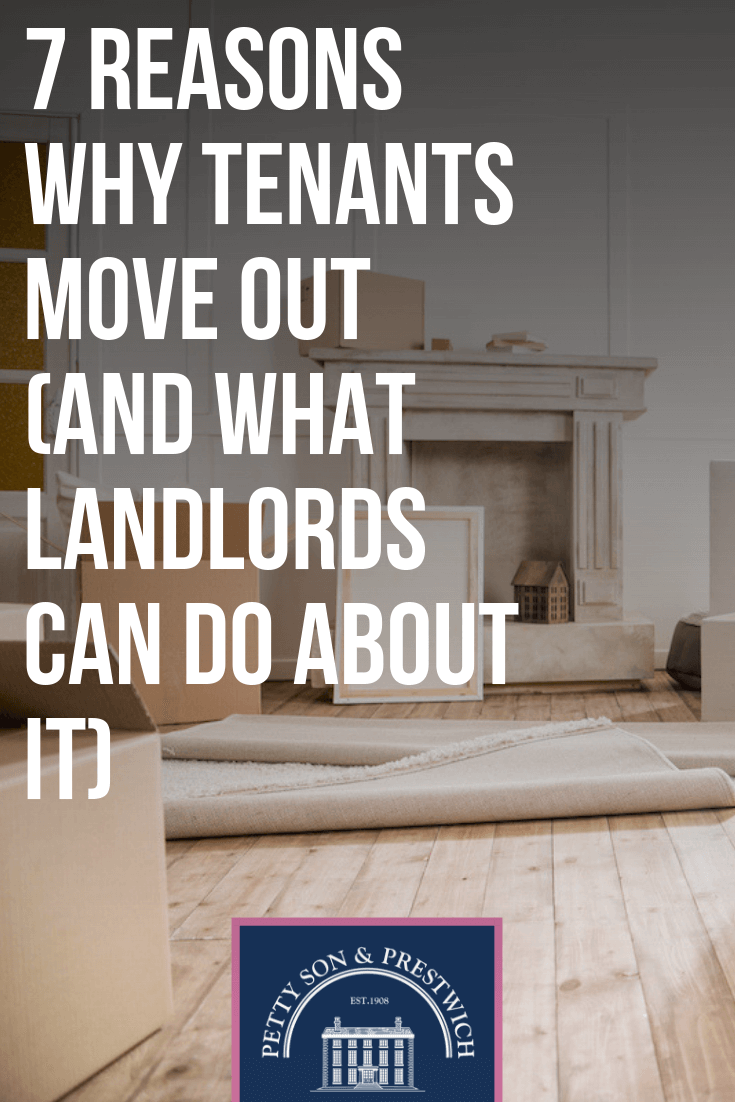Finding great tenants isn’t always straightforward, so when they do come along it’s vital for landlords to keep hold of them for as long as possible. Not only will this remove the headache of finding new inhabitants for your rental, it could also mean you won’t be subjected to the dreaded void period, too.
However, some tenants simply up and leave. Many landlords would argue there’s little you can do to avoid that situation, but we’re not so sure. Knowing the most common reasons why tenants move out of rentals will enable you to be proactive in some areas and give you food for thought in others. It’s worth checking out.
With this in mind, we’ve compiled a list of the top 7 reasons tenants give landlords when they want to leave their properties. We’ve also included a few tips and pointers on how you can keep hold of your great tenants and possibly prevent the desire to move arising in the first place.
Let’s take a look!
Need a bigger property

The reasons for needing more space are many: cohabiting with a partner, having a child, remote working, starting a home business, needing an extra bathroom, desiring outdoor space...and so it goes on.
Obviously, you can’t just throw an extension together at the drop of a hat, but you may be able to persuade your tenants to stay in other ways. As we’ve mentioned numerous times on this blog, good communication is vital between landlord and tenant (or tenant and letting agent if your property is managed), and this is another example of its importance.
Open up a dialogue with your tenant and see if there’s anything you can do to help? It could turn out that the need for more space can be negated by an upgrade of some kind. You won’t know until you ask.
For those with portfolios, offering a larger property from your books could be an option. Have you got a tenancy ending soon? Consider your options fully.
Need a smaller property
The yin to the above reason’s yang, downsizing is a popular motive for tenants to move. As with the need for more space, requiring less can often be addressed in a similar fashion, namely offering incentives that will make tenants change their mind and stay.
Naturally, the same applies to portfolio holders here, too, only in reverse, obviously!
Change in finances

As with the above reasons, changes to a tenant’s financial situation can be similar and different at the same time. On the one hand your property may become too expensive, while, on the other, a positive change in a tenant’s financial situation could initiate a desire for a larger living space.
The obvious solution to the ‘too expensive’ reason would be to negotiate on rent. Can you afford to take a little less in order to keep these trouble-free tenants in place? Don’t forget that void periods can prove to be very expensive when considering this.
Again, those who hold a portfolio of properties have more options at their disposal. It could be the case that you have a property on your books that would suit the tenant better, be it more or less expensive, depending on their circumstances. Naturally, it’s better to keep good tenants under your umbrella, and you’ll also only have to fill one property rather than two. Win-win.
State of property
Oh dear. If you’re hearing this from your tenant, you’ve not been performing optimally as a landlord. The better news is that these issues can often be easily fixed, and a good tenant highlighting them by threatening to end their tenancy can prove to be a much-needed wake-up call that will help improve your overall buy-to-let business. Providing you listen to them, of course!
Offer to make good on any concerns they have and implement a regular maintenance programme to keep on top of small jobs before they become big problems. Again, having a reputable letting agent manage your property can help here, as their periodic inspection visits will turn up issues early and make you aware of them.
Nightmare neighbours

There are a number of reasons why neighbours can prove to be a problem for tenants, and there’s often very little landlords can do about it should their renters bring it to them as a concern.
Next door neighbours are especially tricky to handle, but complaints from good tenants living in a HMO you own can be made aware of how their actions/behaviour may affect others in the property, so you should broach this with them. The last thing you want is a bad tenant driving good ones away, so try and nip problems in the bud wherever possible.
Change of neighbourhood
The neighbours might not be the problem, but the neighbourhood can sometimes no longer meet the needs of your tenants and cause them to want to move on. The reasons for this change of heart about an area are too numerous to mention, but is there anything you can do to persuade them to stay?
Well, a lot will obviously depend upon what their specific reason is. If they wish to move to the other end of the country (or the world, for that matter) to be closer to family, then there’s little you can do. If, however, the reasons are more workable, then an incentive to stay could be all that’s required to initiate a change of heart.
One thing to bear in mind here, though, is not to be pushy about it. Simply make an offer, be it a decrease in rent or an upgrade to the property, and leave it with them. Pummeling them into submission is not going to make for a happy tenancy, and unhappy tenants are not the aim.
Change in personal circumstances
This could be a catch-all for the reasons we’ve given so far, but it’s still a reason that is often cited by tenants when they want to move out of a rented property. It could be anything from separating with a partner through to..well...you name it!
What can you do as a landlord when confronted with this as a reason to end a tenancy? Same as it ever was. Open a dialogue, discuss the reason fully, and see if there’s a solution you can come up with. The likelihood is that there won’t be in this instance, but if the tenant is good enough you should be willing to try.
As you can see, the reasons may vary dramatically, but there is a common thread running through them all: communication with your tenants is vital. Building a good relationship with those who rent your properties is key to your success as landlord, and it can be rewarding in ways that go beyond financial advantages, too.
Here at Petty’s, we take great pride in the relationships we build with clients - regardless of whether they are tenants or landlords, buyers or sellers. If you feel as though you need help with your rental properties in this increasingly difficult arena for landlords, give us a call. Our property management team will be more than happy to go over how we can help you achieve your goals and make the whole business of buy-to-let easier and less stressful for you to handle.
